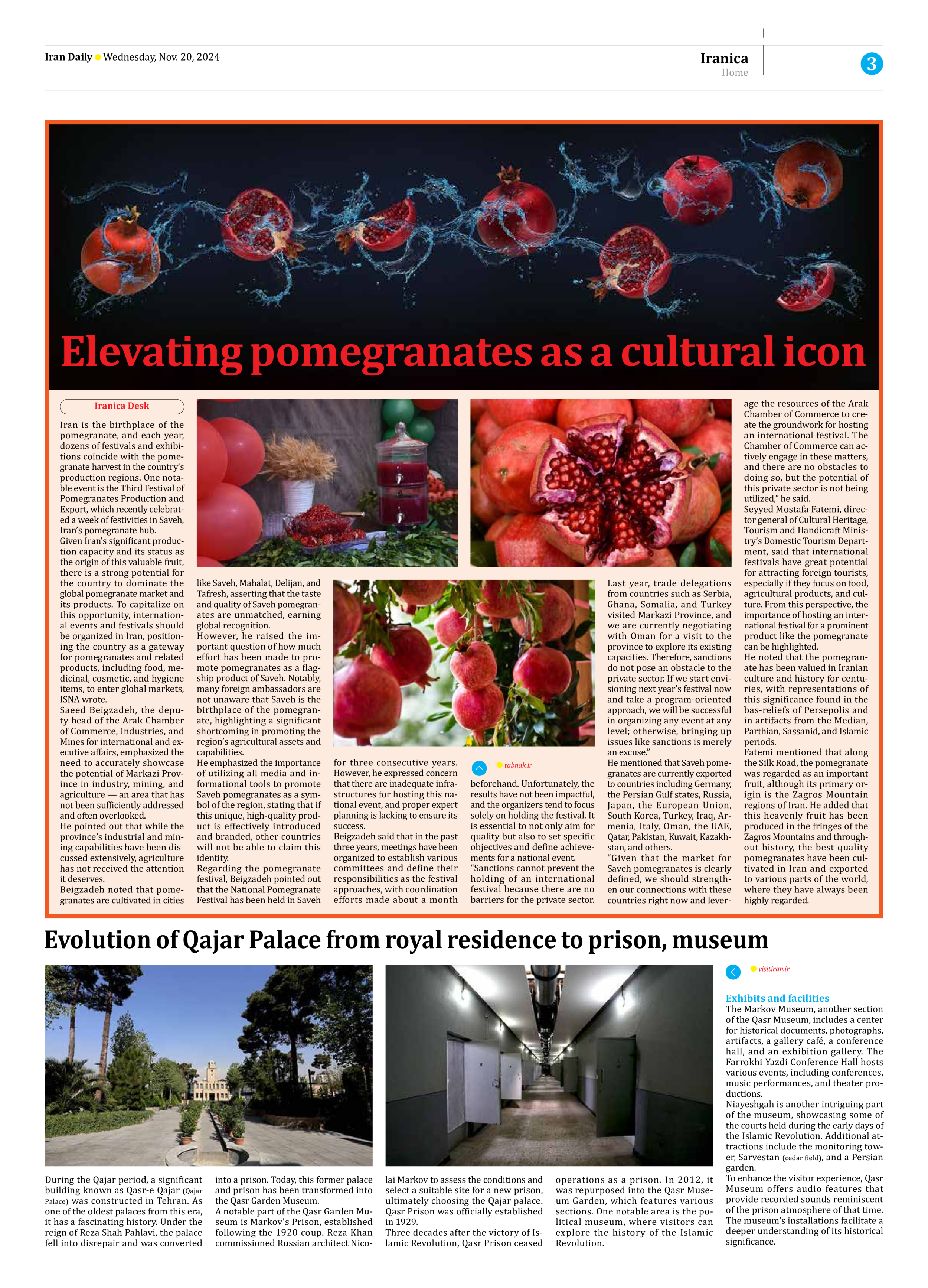
Elevating pomegranates as a cultural icon
Iran is the birthplace of the pomegranate, and each year, dozens of festivals and exhibitions coincide with the pomegranate harvest in the country’s production regions. One notable event is the Third Festival of Pomegranates Production and Export, which recently celebrated a week of festivities in Saveh, Iran’s pomegranate hub.
Given Iran’s significant production capacity and its status as the origin of this valuable fruit, there is a strong potential for the country to dominate the global pomegranate market and its products. To capitalize on this opportunity, international events and festivals should be organized in Iran, positioning the country as a gateway for pomegranates and related products, including food, medicinal, cosmetic, and hygiene items, to enter global markets, ISNA wrote.
Saeed Beigzadeh, the deputy head of the Arak Chamber of Commerce, Industries, and Mines for international and executive affairs, emphasized the need to accurately showcase the potential of Markazi Province in industry, mining, and agriculture — an area that has not been sufficiently addressed and often overlooked.
He pointed out that while the province’s industrial and mining capabilities have been discussed extensively, agriculture has not received the attention it deserves.
Beigzadeh noted that pomegranates are cultivated in cities like Saveh, Mahalat, Delijan, and Tafresh, asserting that the taste and quality of Saveh pomegranates are unmatched, earning global recognition.
However, he raised the important question of how much effort has been made to promote pomegranates as a flagship product of Saveh. Notably, many foreign ambassadors are not unaware that Saveh is the birthplace of the pomegranate, highlighting a significant shortcoming in promoting the region’s agricultural assets and capabilities.
He emphasized the importance of utilizing all media and informational tools to promote Saveh pomegranates as a symbol of the region, stating that if this unique, high-quality product is effectively introduced and branded, other countries will not be able to claim this identity.
Regarding the pomegranate festival, Beigzadeh pointed out that the National Pomegranate Festival has been held in Saveh for three consecutive years. However, he expressed concern that there are inadequate infrastructures for hosting this national event, and proper expert planning is lacking to ensure its success.
Beigzadeh said that in the past three years, meetings have been organized to establish various committees and define their responsibilities as the festival approaches, with coordination efforts made about a month beforehand. Unfortunately, the results have not been impactful, and the organizers tend to focus solely on holding the festival. It is essential to not only aim for quality but also to set specific objectives and define achievements for a national event.
“Sanctions cannot prevent the holding of an international festival because there are no barriers for the private sector. Last year, trade delegations from countries such as Serbia, Ghana, Somalia, and Turkey visited Markazi Province, and we are currently negotiating with Oman for a visit to the province to explore its existing capacities. Therefore, sanctions do not pose an obstacle to the private sector. If we start envisioning next year’s festival now and take a program-oriented approach, we will be successful in organizing any event at any level; otherwise, bringing up issues like sanctions is merely an excuse.”
He mentioned that Saveh pomegranates are currently exported to countries including Germany, the Persian Gulf states, Russia, Japan, the European Union, South Korea, Turkey, Iraq, Armenia, Italy, Oman, the UAE, Qatar, Pakistan, Kuwait, Kazakhstan, and others.
“Given that the market for Saveh pomegranates is clearly defined, we should strengthen our connections with these countries right now and leverage the resources of the Arak Chamber of Commerce to create the groundwork for hosting an international festival. The Chamber of Commerce can actively engage in these matters, and there are no obstacles to doing so, but the potential of this private sector is not being utilized,” he said.
Seyyed Mostafa Fatemi, director general of Cultural Heritage, Tourism and Handicraft Ministry’s Domestic Tourism Department, said that international festivals have great potential for attracting foreign tourists, especially if they focus on food, agricultural products, and culture. From this perspective, the importance of hosting an international festival for a prominent product like the pomegranate can be highlighted.
He noted that the pomegranate has been valued in Iranian culture and history for centuries, with representations of this significance found in the bas-reliefs of Persepolis and in artifacts from the Median, Parthian, Sassanid, and Islamic periods.
Fatemi mentioned that along the Silk Road, the pomegranate was regarded as an important fruit, although its primary origin is the Zagros Mountain regions of Iran. He added that this heavenly fruit has been produced in the fringes of the Zagros Mountains and throughout history, the best quality pomegranates have been cultivated in Iran and exported to various parts of the world, where they have always been highly regarded.







